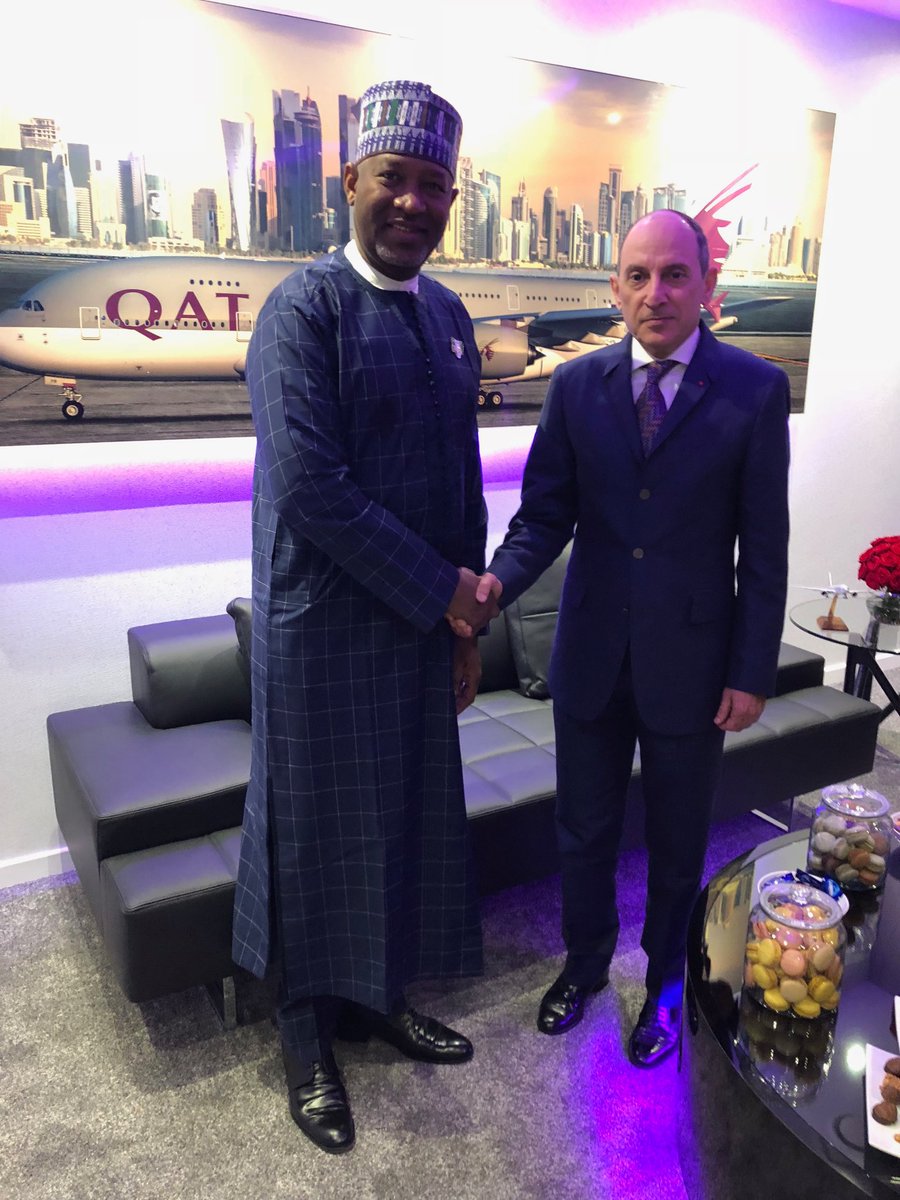
Many Nigerians have become nostalgic about the federal government’s plan to launch another national airline, but there are still doubts over the future, funding, and profitability of the planned airline.
The logo and name of the planned national carrier, which is billed to start operation in December this year, was unveiled at the Farnborough Air Show on Wednesday.
This was a major step towards the realisation of the airline, which if successful, would make Nigeria a key player in the air transport sector in Africa.
Government has also shown firm commitment to the new airline, which actualisation is considered as a major programme of the Muhammadu Buhari administration in the aviation industry.
The contribution of national carrier to the development of aviation in any country is invaluable because it becomes the fulcrum for aviation training, establishment of maintenance facility, catering, ground handling, aircraft leasing and creation of jobs.
Industry observers indicate that if the defunct Nigeria Airways was not liquidated in 2003, the country would have recorded significant progress in the air transport sector.
They posited that today, over 90 per cent of Nigeria travellers to international destinations are airlifted by foreign carriers.
They also noted that about 500 pilots who are today unemployed in Nigeria would have secured jobs with the national carrier or completed their type-rating with the airline.Today, Nigeria lacks young pilots, engineers and other technical personnel because a national carrier, which serves as catalyst for manpower development is absent.
Private Sector
When the Minister of State, Aviation, HadiSirika hinted that one of the key achievements for the Buhari administration in the aviation industry would be the establishment of a national carrier, he emphasised that it would be private sector driven.
But today, as the process to have a national carrier has advanced, there is no indication that it would be established on private equity. Rather, government is committing huge funds towards the project.
Recently the Infrastructure Concession Regulatory Commission (ICRC) issued Outline Business Case Compliance Certificate for the actualisation of the national carrier project.
In the outline, the ICRC said it had reviewed the Project Structure Report PRS/Outline Business Case (OBC) submitted by the Federal Ministry of Transportation (Aviation) for the Establishment of a National Carrier via a Joint Venture(JV) PPP arrangement.
“Based upon the assessment and review of the PSR/OBC, market study and all other information available, this certificate confirms that the submission is in substantial compliance with the ICRC Act, 2005 and the National Policy on Public Private Partnership.
“This certificate is granted on the condition that the federal government demonstrates her commitment to the leverage of the national carrier through the provision of an upfront grant/ Viability Gap Funding (VGF) to fund aircraft acquisition/start-up capital.
“The FGN also agrees to zero contribution to airline management decisions and zero management control by the government. Any attempt to impose government control over the management of the airline invalidates this certificate and the entire process,” ICRC warned.
ICRC said the validity of the certificate was stated to be 12 months, “In view of the fact that the mitigating conditions for the project may change over time, this certificate is valid for 12 months from the date indicated below.”
“This certificate is therefore issued to enable the Ministry to commence an international open competitive bidding process to procure a world-class strategic investor to manage, operate, maintain and invest in the national carrier.”
But Sirikarecently admitted that the initial cost for the project was $8.8 million and this was in addition to N1.7 billion paid to consultants.
Funding
Also,Sirika confirmed that the proposed airline would gulp $8.8 million as preliminary cost and $300 million as take-off cost and that the project would be executed through PPP.
But so far, there is no indication that the private sector would inject funds in the airline.
Industry consultant and CEO of BelujaneKonsult, Chris Aligbe, told THISDAY recently that it was not likely that private investors would fund the project until after it has taken off.
He explained that the investors would want to know what they are putting their money into. So, the airline must be viable before such commitment.
But Sirika has so far been mum about any interested party willing to invest or has invested money in the airline.
THISDAY learnt that so far, the committee on national carrier, led by the Minister has held meeting with aircraft manufacturers, Standard Chartered Bank, Qatar Airway and Ethiopia Airlines.
The meetings with aircraft manufacturers was for aircraft orders or acquisition, that of the bank was for funding, while the meetings with Ethiopia Airlines and Qatar were for securing core investor or technical partner for the planned airline.
Technical Processes
Nevertheless, industry stakeholders have maintained that while they look forward to a successful national carrier for the nation, they are still in the dark about how government would realise the airline.
They argued that there was no clear picture on how the government wish to start the company, what the share capital would be and the definition of its ownership, since Sirika said it would be private sector driven.
“What we do not understand is how the national carrier can be realised in less than six months to the deadline when government said it would establish the airline,” an operator who pleaded to remain anonymous said.
Also, a senior official in one of the airlines who said a national carrier would provide the pivot for the development of aviation in Nigeria, however pointed out that, “If the federal government is establishing the airline, it has to be backed by an Act establishing it, which means we must go back to the National Assembly.
“I doubt that this could be realised in the next six months because it will take time and you must have to repeal the Act that established the defunct Nigeria Airways Limited (NAL) before you enact a new Act for the national airline.”
Transparency
Many industry stakeholders who spoke to THISDAY, argued that the process of establishing the national carrier has not been transparent, saying there was nothing on ground to show that the airline was about to take off.
So far, there is no physical office for the airline that would take off in December, there is no recruitment of personnel and other structures needed for the take-off of the airline are not available, they said.
Another insider told THISDAY that it was not appropriate for government to unveil the logo and name of the new national carrier in Britain without informing the stakeholders or to get Nigerians involved in the plan to establish the airline.
“It is not appropriate to unveil the airline overseas without keeping those at home abreast of what is happening. He ought to have told stakeholders before heading to London.
“Soon we shall arrive at a T junction that any move we will make will determine the success or failure of the airline. There is so much that is opaque about the airline. This is where others had reached before and because of the secretary surrounding the plan, it failed,” a source told THISDAY.
While feelers also indicate that the minister has started looking out for those to recruit for the airline, some stakeholders are of the view that if the private sector would be involved and if the airline would have technical partner or core investor as stipulated, it would not be the duty of the minister to appoint personnel for the new airline.
“That is the job that should be done by the core investor or technical partner, but government should provide guidance by saying, for example, that all the second line managers must be Nigerians because these would be the people that would take over subsequently.
“We know what happened to Virgin Nigeria Airways and what happened to the airline that was to be floated by the past administration. It was secrecy that killed it,” the source said.
Aircraft Leasing
When the minister unveiled the federal government’s plan in the aviation industry in 2016, he had said that in addition to establishing a national carrier, the government would also establish a leasing company and a maintenance facility.
He had explained that a leasing company would supply the new airline aircraft while maintenance would be carried out at the maintenance facility in Nigeria.
This he had noted would help Nigeria conserve foreign exchange as aircraft maintenance gulps airlines’ resources because major maintenance is carried out overseas.
Owing to this, industry observers are of the view that there are no indication that the leasing company was about to be established.
In addition, they argued also that is also no plan to set up maintenance facility, the establishment of a national carrier is like setting the cart before the horse.
Sirika had earlier said that one of the factors that led to the failure of Nigeria Airways was the inability of the airline to maintain its aircraft locally.
That, by the time the airline went under, the engines of its aircraft were located at maintenance hangars in three continents.
Procedures
Industry stakeholders are also of the view that before the airline would start operation it must establish its own manual, and this takes at least three months to realise because by law the airline has to submit operational and organisational manual, which comes in sequences and this must go through the processes.
The President of Aviation Round Table (ART) and a seasoned aviator, Gbenga Olowo said, “”If Nigeria must have a national airline again, then we must get it right. This is my point. The ICRC is obviously insisting on private sector control and management, because it was government inefficiency that killed off the old Nigeria Airways.
“The airline became a gravy train for the big men in high places. They used the planes for their private purposes…”
Perhaps some of these procedures could be skipped for the establishment of the national carrier but if they are skipped it would not be said that due process was followed in its establishment.
THISDAY






